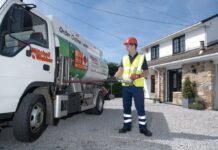A family-run heating oil supplier has welcomed a visit by a Government select committee to a Cornish village to highlight the benefits of renewable fuels.
Kehelland is representative of numerous rural villages in Cornwall. Like many others, it is not connected to the gas main, relying instead on kerosene-powered boilers for heating.
The Government is pushing for properties to transition away from their existing heating systems to install costly new heat pump systems.
However, Mitchell & Webber, operating across Cornwall, Devon, Somerset, and Dorset, believes that renewable heating fuels containing HVO (Hydrotreated Vegetable Oil) offer a solution and has evidence to support this.
The business is voicing its support for recent Government legislation and discussions in Parliament around the alternative fuel, which also saw a private members bill to reduce the duty charged on renewable liquid heating fuel pass.
National trade associations OFTEC and UKIFDA are joining Mitchell & Webber’s calls, with their CEOs also joining the select committees visit. They are now urging the Government to publish the consultation immediately to provide clarity for consumers, as many of the inquiries run by such select committees require a governmental response.
In November 2020, the firm, led by brothers Robert and John Weedon, successfully installed and delivered HVO to the first UK property in Scorrier. Building on this success, they decided to replicate the initiative in Kehelland.
John Weedon said: “We wanted to showcase a village scenario with a school, a church, and at least 25 homes to demonstrate the scalability of our solution – Kehelland was the perfect candidate and a great example of the benefits of HVO.
“We invited the select committee to witness the success of our trial and to emphasise the need for HVO as a heating and hot water fuel in off-grid gas properties.
“Currently, there is no fuel duty on heating kerosene, whereas HVO incurs a 10p per litre duty. For many unable to invest in costly heat pumps and insulation, offering a green alternative and greater choice is crucial.”

Testimonials from homeowners in Kehelland further underscored the benefits of HVO:
Dave Biggs
“HVO has proven to be highly effective and efficient. The projected cost to insulate our property exceeds £70k. Given this considerable investment, it raises the question of why I would opt for another decarbonisation technology such as heat pumps. Government sources indicate that heat pumps can reduce CO2 emissions by up to 80%. However, HVO boasts an even greater reduction rate of 88-90%. By adopting HVO, we’ve seamlessly transitioned to a cleaner fuel without incurring the substantial rebuilding expenses associated with alternative solutions.”
Nigel and Stephanie Uren
“For over two years now, we’ve relied on HVO in our boiler, and it has been nothing short of wonderful. Unlike the constant noise associated with heat pumps, HVO allows us to run the boiler as needed, providing a quieter environment. Although we’ve explored alternative technologies like heat pumps, the prospect of needing to install three-phase electricity presents a significant hurdle. The estimated cost for this installation is approximately £10k, which adds another layer of consideration to our decision-making process.”
Andrew and Claire Waterhouse
“The select committee actually saw the renewable fuel being delivered to our property. For over two years, we’ve been delighted with this fuel, reducing our carbon footprint by nearly five metric tonnes annually. Despite this, we continue to rely on our existing combi boiler system for home heating and hot water. Transitioning to another technology would pose challenges and incur significant expenses, particularly as we lack a hot water cylinder.”
Headteacher Ellie Watkins, Kehelland School
“As the only school in the UK using this renewable fuel, we’ve seamlessly operated on HVO for over two years without encountering any issues. Given our budget constraints, introducing other technologies would simply be unfeasible. Moreover, why would we consider changing a system with a remaining lifespan of 20-30 years? While we actively teach our students to contribute to environmental preservation, we can proudly assert that as a school, we are effectively reducing our carbon emissions and practising what we preach.”
Robert and John Weedon were delighted by the successful visit and hope that the positive comments from homeowners will sway the select committee.
Robert Weedon said: “Property owners will ultimately play the key role in deciding how to decarbonise their properties.
“They remain sceptical about the effectiveness of retrofitting technologies like heat pumps, and are hesitant to take risks when they already have a reliable and proven system that can decarbonise more simply and cost-effectively with renewable fuel.
“Despite the industry’s readiness to progress, there’s a prevailing frustration with the perceived lack of urgency within the Energy Department.
“We would greatly appreciate further engagement with ministers and officials from the department, and we extend an invitation for them to visit Cornwall.
“This visit would offer an opportunity to observe firsthand how our initiatives operate and to hear directly from the residents themselves.”










